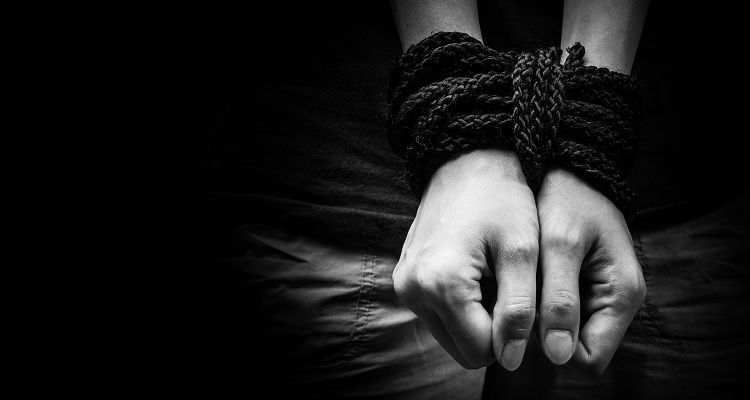By Rachel Ranieri
The Trafficking Victims Protection Act criminalizes human trafficking under federal law. [1] Concurrently, all states have criminalized human trafficking.[2] The laws surrounding human trafficking have a substantial impact on victims, who are often forced to commit criminal offenses.[3] Many state criminal laws do not recognize exceptions or give immunity from prosecution for victims of human trafficking who are forced to engage in criminal activity.[4] Furthermore, only three states provide immunity from prosecution for children under the age of eighteen who have engaged in prostitution-relation offenses.[5] If our state laws are criminalizing the very victims other laws are supposed to protect: are these laws aiding victims at all? Are they even intended to help victims or provide victims support or relief in the first place?
Furthermore, interactions with members of the justice system are integral to a victim’s ability to get help and stay out of human trafficking. There is often a high rate of re-entry into human trafficking, which has a lot to do with Maslow’s Hierarchy of needs often being met in trafficking situations and a lack of trust of members of the justice system.[6] For example, an investigation into four officers and their connection to a trafficking ring is presently ongoing in Virginia.[7] Two women have testified against the officers that they were clients of the prostitution ring and served as its protectors.[8] Both women said they could not flee to police because they believed the police were protecting the head of the ring and that they would be criminalized as prostitutes.[9] Further, children are still being legally arrested, detained, and prosecuted for prostitution in the majority of states, and there are little to no checks on whether these acts are consensual or not.[10] Overall, criminalization can undermine efforts to combat trafficking “because it destroys trust, retraumatizes victims and reinforces what traffickers may have told victims about law enforcement authorities.”[11]
In a report submitted to the DOJ entitled” Law Enforcement Responses to Human Trafficking and the Implications for Victims,” the recommendations for the field included increasing law enforcement understanding of human trafficking and a more comprehensive understanding about their role in human trafficking.[12] Only 34% of line officers reported being “knowledgeable” to “very knowledgeable” about human trafficking.[13] When asked whether human trafficking is viewed as a serious issue in the community, 25% indicated it was not a problem or only a minor problem, 39% indicated somewhat a problem, and 36% indicated it was a serious/very serious problem in their communities (state/local investigators and police/line officers were the polled groups).[14] If the officers being dispatched to protect and play a pivotal role in helping victims of trafficking are not even aware of the seriousness of trafficking or the urgency of the problem, it is unlikely a lot of help is being provided for victims of trafficking and violence.
Victims of human trafficking are often prosecuted and not provided immunity for acts related to their victimization. The lack of knowledge of those dispatched to protect them and lack of immunity in the law plays a large part in why this happens and why many victims end up back in a situation of human trafficking. A lot needs to be done at the legislative level and for members of law enforcement to ensure that victims are being protected, treated as victims, and not treated as criminals.
[1] Criminalization of Trafficking Victims, Int’l Women’s Hum. Rts. Clinic (May 2015), https://www.law.cuny.edu/wp-content/uploads/page-assets/academics/clinics/hrgj/publications/Criminalization-of-Trafficking-Victims.pdf.
[2] Id.
[3] Id.
[4] Id.
[5] Id.
[6] Why Human Traffickers Target Vulnerabilities, Stop the Demand Project (Sept. 14, 2021), https://www.stopthedemandproject.com/blog/why-human-traffickers-target-vulnerabilities.
[7] Matthew Barakat, Woman Testifies in Trial of 4 Ex-Virginia Cops Accused of Aiding Sex Trafficking, The Va. Pilot (Jan. 12, 2023), https://www.pilotonline.com/news/crime/vp-nw-police-sex-trafficking-20230112-4hk2rtetsrg5jdkxe33xqcypzy-story.html.
[8] Id.
[9] Id.
[10] Int’l Women’s Hum. Rts. Clinic, supra note 1.
[11] U.N. Doc. A/HRC/20/18 (June 6, 2012).
[12] Heather J. Clawson et. al, Law Enforcement Response to Human Trafficking and the Implications for Victims: Current Practices and Lessons Learned, Caliber (Oct. 2006), https://www.ojp.gov/pdffiles1/nij/grants/216547.pdf.
[13] Id.
[14] Id.

